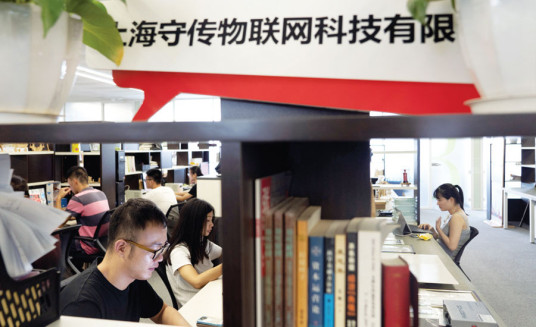Powerhouse in the making
 |
|
Young entrepreneurs and employees work in the office of Zhang Jiang Transnational Enterprises Joint Incubation Platform in Shanghai in this file photo from August 2018. GAO ERQIANG / CHINA DAILY |
The municipal government also released new industry guidelines to bolster the development of emerging industries like medicine, smart manufacturing and intelligent cars.
The numbers show that Shanghai has been sparing no effort in driving technological breakthroughs.
Last year, research and development spending accounted for 4 percent of Shanghai's 3.27 trillion yuan ($487.6 billion) GDP. Meanwhile, the number of patents per every 10,000 residents had surged to 47.5, up from 13.3 in 2011.
This pursuit of its ambitions has also boosted economic output. The city's GDP broke the 3 trillion yuan threshold in 2017, and last year's figure is a whopping 1,000 times more than that of 1949, the founding year of the People's Republic of China. It is also 100 times that of 1978, when China first introduced the reform and opening-up policy.
Shanghai's per capita GDP, a broad gauge of living standards, reached 135,000 yuan ($20,131) in 2018, up by 250 times from 1949 and exceeding the $20,000 threshold of a developed economy for the first time.
LAIX, an app that uses algorithms to help improve a user's pronunciation of English words, is one of the beneficiaries of Shanghai's quest to become a leading tech hub.
"The local authorities are very practical and are clearing administrative hurdles every step of the way," said LAIX CEO Wang Yi, who used to work at Google.
Citing perks such as subsidies for hiring locals, and housing benefits, Wang pointed out that Shanghai's"international appeal and inclusive culture" makes it attractive for talent around the world.
The strides made on the tech front are compelling the major domestic players to join in the action. Since the second half of 2018, Baidu, Alibaba and Tencent have been scrambling to ink strategic partnerships with the municipal government, hoping to capitalize on the city's vast talent pool, policy incentives and access to international resources.
Business executives have also singled out Shanghai's industrial strength as a key element in its pursuit of tech innovations.
Chen Yujun, head of the strategy department at Shanghai Huahong Integrated Circuit Co Ltd, said the city's rich industry resources have enabled it to become one of the world's most comprehensive chip clusters.
"We've seen the mushrooming of 239 chip design companies, nine wafer fabrication foundries and a number of world-leading integrated circuit packaging firms in Shanghai's Zhangjiang Science City," he said.
Tencent chairman Pony Ma, in his keynote speech at the inaugural World Artificial Intelligence Conference in Shanghai in September, echoed that sentiment, saying: "The matured industrial chain of smart chips as well as software and hardware services have equipped Shanghai with an exceptional advantage in AI development."
This factor has been important for Tencent. As its consumer-end business faces increasing regulatory pressure and a saturated internet penetration rate, the social media and gaming giant has been shifting focus toward providing industrial oriented solutions.
In 2016, Tencent set up YouTu Lab, its in-house AI arm, in Shanghai, in the hope of devising tangible solutions for a variety of real-life scenarios. SenseTime, a Chinese tech unicorn, has taken the same approach.
The company recently made its foray into the public transportation sector, teaming up with E-Drive, a Shanghai bus operator that uses new energy vehicles. As part of this partnership, E-Drive's buses will be equipped with SenseTime devices that detect drivers' fatigue levels through facial scanning technologies.
This bus project is part of a broader collaboration between SenseTime and SAIC, E-Drive's parent company, to construct an intelligent municipal transport system. SAIC, the operator of the city's largest car manufacturing base, has a campus which is equipped with tracks for self-driving automakers to run tests.
Microsoft is among the torrent of global tech powerhouses riding the waves generated by Shanghai's ambitions, bringing to the city some of its most advanced research facilities.
The company's latest move includes the opening next month of an AI and internet of things lab — the largest of its kind in the world.
According to Microsoft, the facility will help about 300 local clients turn their prototypes into products each year.
Such developments are heartening news for the city, said Yuan Tao, chairman of Shanghai Zhangjiang Group, the operator of Zhangjiang Science City. The venue is a special zone dedicated to developing strategic emerging industries.
Yuan currently oversees the 66,000-square-meter AIsland, which hosts a slew of AI-related research labs. Both global organizations and local startup firms are among the first batch of 20 companies. Names include Microsoft, Alibaba, Cloud-Walk Technology, and a research facility affiliated to Tongji University in Shanghai.
"The profile of these companies, together with the cluster of companies from the upstream and downstream sectors, will help AIsland lead the national AI pack and secure Shanghai's position as a budding highland for tech innovation," said Yuan.
He added that AIsland, which also acts as an incubator for AI companies, will pave the way for the development of a wellspring of Shanghai tech firms known for their business model innovation.
